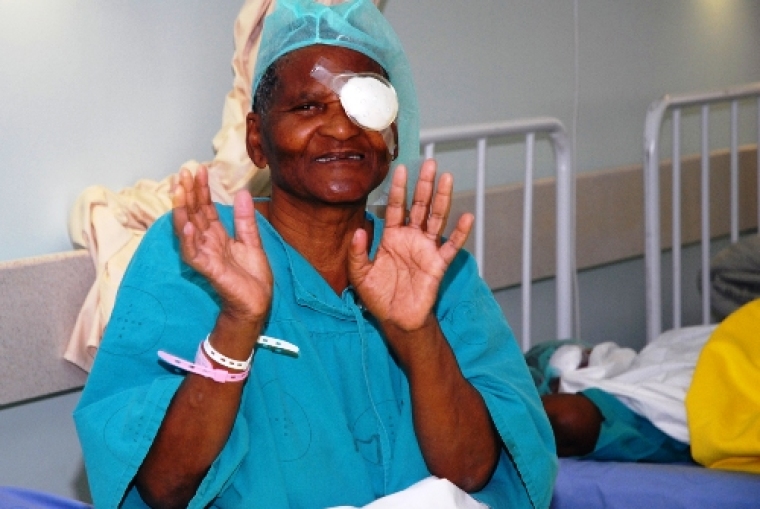
Almost 23,000 people in South Africa's Eastern Cape Province are unnecessarily blind, and are not aware that cataract surgery can restore their sight. A three-phase plan of intervention is in process at three area hospitals in South Africa, providing effective eye care to those with little or no access to medical care.
The Mercy Ships Eye Team is working in partnership with The Fred Hollows Foundation, the Eastern Cape Provincial Department of Health, and management professionals from each hospital to use current resources most efficiently. A major problem is the prevailing public opinion among the poorer people of the community that a hospital is where one goes to die. Another obstacle that has to be overcome in getting people to seek help is a system of payments to the blind, often a person's only source of income.
Medical professionals in the Eastern Cape region are working to eliminate these obstacles. The 2010 Sabona Sonke Campaign is one of their most successful efforts. This plan of intervention focuses on increasing effective eye care to those with no other medical access.
The program begins with assessment of the current system, training of eye teams, and the transporting of patients to hospital locations. The second phase calls for the training of ophthalmologists in the Mercy Ships expedited procedure of cataract removal, and referrals of cataract patients to be received at the hospital sites. The final phase includes the cataract operations, assessment and debriefing following the cataract surgeries, and the continuation of the program at future sites.
When word of the eye project went out, mainly by word of mouth, people crowded the screening sites. They shared a common hope – to have their sight restored.
Mandoyisile Esther Ntanjana, one of the cataract patients, was totally blind. Her neighbor had also been blind, but had recovered her sight after a similar surgery. The neighbor encouraged Mandoyisile to have the procedure. Mandoyisile's brilliant smile reflected her great joy after the successful surgery. With great excitement, she declared, "I had a dark view before. Now I can see! I am happy!"
Head of the Mercy Ships eye team, Dr. Glenn Strauss is working closely with ophthalmologists at each location being used for the campaign. He hopes this process will open doors to new strategies for addressing blindness that will be duplicated easily in other areas. In this way, effective eye care will continue after Mercy Ships leaves South Africa.
Mercy Ships is a global charity that has operated hospital ships in developing nations since 1978 providing free health care and community development services to the forgotten poor. Following the example of Jesus, Mercy Ships brings hope and healing to the poor. Working in partnership with local people, Mercy Ships empowers communities to help themselves. The result is a way out of poverty.
The emphasis is on the needs of the world's poorest nations in West Africa, where the world's largest charity hospital ship Africa Mercy provides the platform for services extending up to ten months at a time. Mercy Ships works on land-based projects in Sierra Leone in partnership with other organisations, while teams also work in several nations of Central America and the Caribbean. Mercy Ships Australia, one of 14 international support offices is based on the Queensland Sunshine Coast.
For more information, visit: www.mercyships.org.au